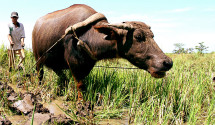The Agrarian Roots of Violent Conflict
Temas
Regiones
Conflict in Southern Philippines is caused as much by agrarian economics and politics as ethnic and religious differences.

Autores
Download the paper The Agrarian Roots of Contemporary Violent Conflict in Mindanao [pdf 152KB]
The decades-old conflict in Mindanao, Southern Philippines, is often framed as a Muslim– Christian conflict and reinterpreted as such within the US-led global war on terror, with the Muslim secessionist movement standing accused of providing a hub for international jihad. In the meantime, global economic integration has made it easier to ignore the agrarian roots of violent conflict in Mindanao, enabling national and sub-national actors, including the international community and the Muslim or Moro separatists, to dismiss the issue of agrarian justice.
global economic integration has made it easier to ignore the agrarian roots of violent conflict
We counter these arguments by
- using an agrarian political economy framework to uncover the roots of resilient violence in Mindanao;
- using historical narratives of the region from the end of the nineteenth century that accentuate the links between state-making, control of land and labour;
- looking at the processes of agrarian modernization
We emphasize the critical role played by the Muslim landed elites who shaped processes of state-making by brokering the interests of their clans with exogenous actors at the national and international level.
We shed light on emerging state policies and competing interests among other landed and agribusiness elites that resulted in the spread of a parallel underground economy, renewing opportunities for violence and crime within semiautonomous social worlds.
Published in Journal of Agrarian Change, Vol. 11 No. 3, July 2011, pp. 298–320
